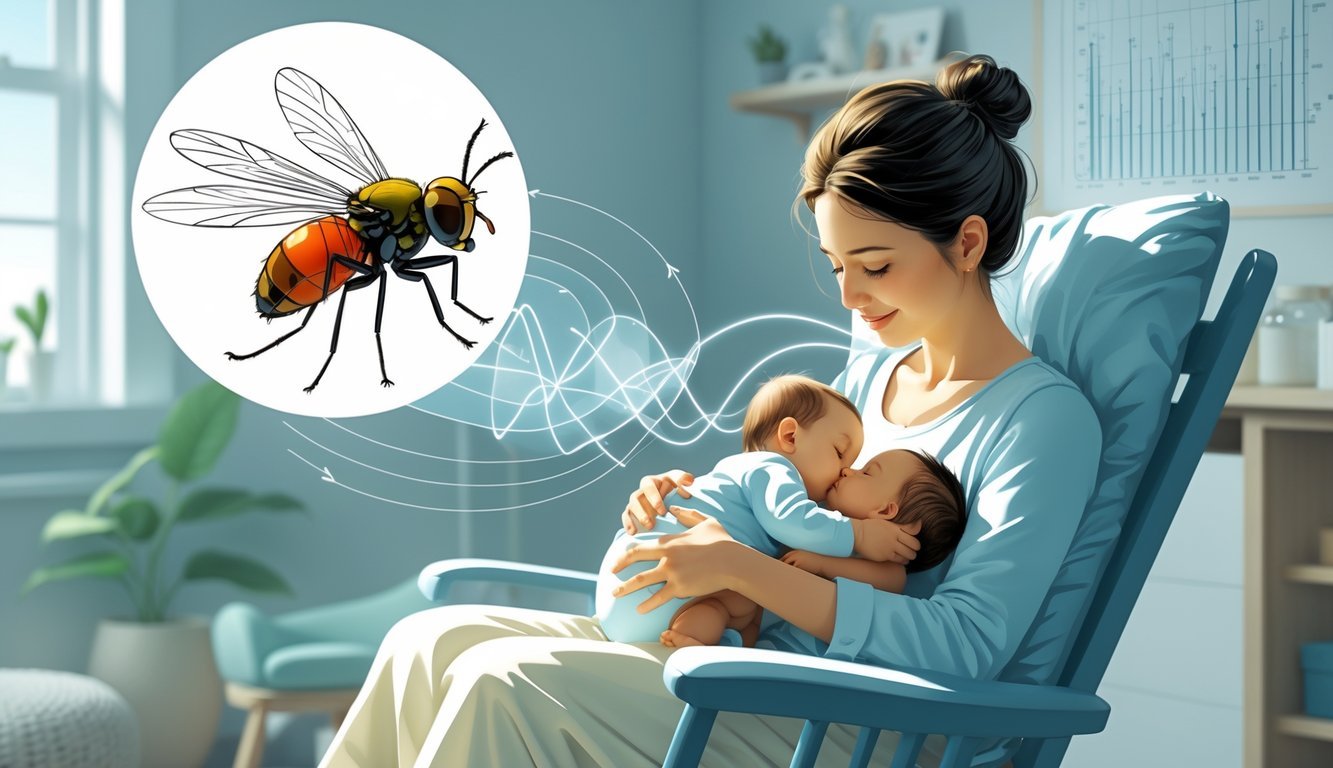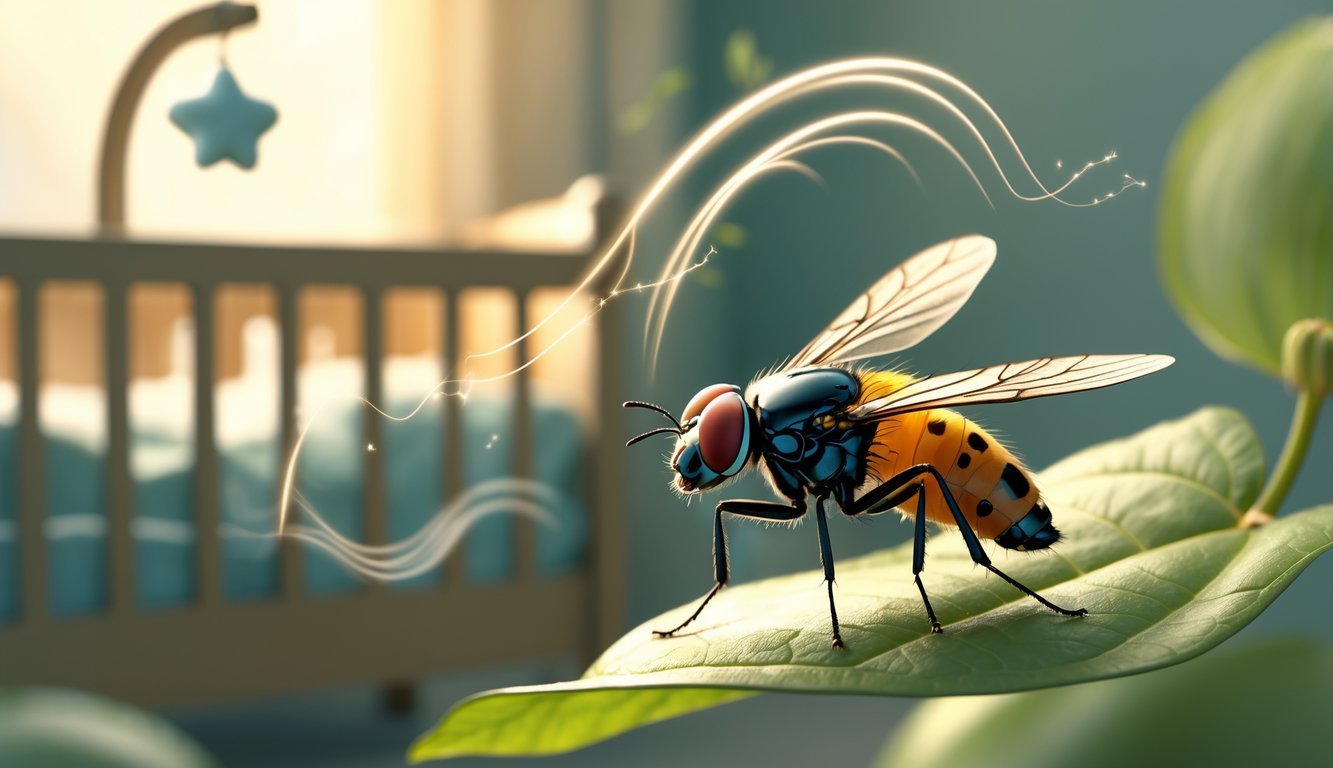PsychNewsDaily Publishers
100 Summit Drive
Burlington, MA, 01803
Telephone: (320) 349-2484
PsychNewsDaily Publishers
100 Summit Drive
Burlington, MA, 01803
Telephone: (320) 349-2484
Gentle vibrations and rocking motions calm babies, promote longer sleep, and reduce fussiness by soothing the nervous system and signaling it's time to rest.

Babies usually fall asleep more easily when you gently rock them. But have you ever wondered why this simple motion works so well? A recent study with fruit flies actually found that gentle vibrations help them sleep longer and deeper.
Researchers think these soft vibrations quiet the brain, making it easier to drift off. That could explain why rocking soothes babies to sleep.
In the study, fruit flies slept longer and woke up more refreshed after feeling soft vibrations. These findings give us a clearer look at how movement affects sleep.
Maybe it’s not obvious, but fruit flies actually share some sleep responses with humans. That makes these tiny insects surprisingly helpful for understanding why rocking and lullabies work for babies.

Why does gentle rocking or vibration seem to calm a restless child? Research on fruit flies shows that their sleep changes with motion and sensory input. This helps us see why similar sensations comfort babies.
Fruit flies sleep longer when they feel gentle vibrations. These back-and-forth motions mimic rocking and help the flies relax and rest deeper.
Scientists found certain neurons in the flies’ sensory organs react to motion. This vibration changes their sleep schedule. Motion does more than soothe; it actually helps regulate their natural rest cycle.
You could think of this as their body’s way of knowing when it’s time to slow down and sleep.
Babies also respond well to gentle movement. When you rock your child, their body senses motion cues, which likely calm their nervous system and help them fall asleep.
It’s not just a parenting trick—it’s a natural response across species. Your baby’s brain may share some of the same pathways seen in fruit flies that use movement to signal sleep.
Soft background noise helps lots of children sleep better. For fruit flies, vibrations act like white noise, blocking out sudden disturbances.
Steady sensory input keeps the environment sleep-friendly. For your child, gentle rocking and soothing sounds can create comforting conditions.
It’s a blend of touch and sound that tells the brain it’s safe to rest. This can reduce fussiness and encourage longer sleep.

Gentle motion and a good sleep environment can help your baby fall asleep more easily. Simple changes make a big difference in sleep quality.
You can protect your baby’s senses and mood by paying attention to these details.
If you’re a parent, rocking your baby gently can help them sleep longer by mimicking natural vibrations that calm the brain. This motion reduces their response to noises or lights that might wake them up.
Try a soft rocking chair or gentle, rhythmic movements when putting your baby to bed. Grandparents have relied on rocking for generations, and it’s still a trusted way to soothe babies.
Don’t rock too hard, though—you might wake or upset your baby. If your child has hearing loss or sensory challenges, this method might still help, since it relies on motion, not just sound.
Light can affect your baby’s sleep. Try to dim or block bright lights in the room during naps or bedtime.
Natural sounds and quiet spaces support better sleep. White noise machines mimic gentle vibrations, but fresh air or soft nature sounds can make your baby feel comfortable.
Avoid loud or sudden noises to protect your baby’s hearing. A calm environment links directly to better sleep patterns and can make bedtime happier for everyone.

Vibrations help animals, including humans, fall asleep and stay asleep longer. Research with fruit flies shows how gentle movement affects brain activity and sleep quality.
These findings offer clues about ways to soothe babies and improve sleep habits.
Vibrations calm the brain and body. This makes it easier for you or a baby to relax and fall asleep.
With repeated exposure to gentle vibrations, the brain can get used to them, which can improve sleep over time.
Fruit flies sleep longer when they feel vibrations. Their simple brains help scientists study how touch and movement can trigger sleep.
This research helps us understand basic sleep processes that might be similar in humans.
Rocking, gentle vibrations, and back-and-forth motions often help babies relax. Soft sounds and a calm environment also support better sleep.
These methods use movement to make babies feel safe and calm.
Yes, the basic effects of vibrations on sleep in fruit flies suggest similar benefits for humans. Even though humans have more complex brains, gentle rocking or vibrations often help babies and adults fall asleep more easily.
Rocking creates a steady, soothing motion that calms the nervous system. This can lower stress and make it easier to drift off.
It also mimics movements you felt as a baby, which can bring comfort.
Yep, there are studies out there. Gentle motion—think rocking or soft vibrations—helps babies and even fruit flies fall asleep faster and stay asleep longer.
Researchers found that these movements can boost brain function and ease stress. That means better, deeper rest for those who experience them.